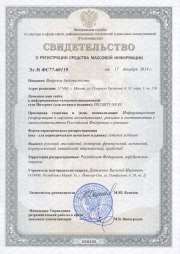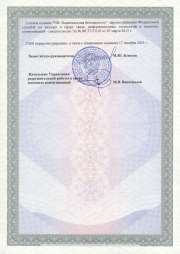|
MAIN PAGE
> Journal "Security Issues"
> Contents of Issue є 03/2023
Contents of Issue є 03/2023
|
Informational support of national security |
|
Nikitin P.V., Gorokhova R.I., Bakhtina E.Y., Dolgov V.I., Korovin D.I. - Algorithms for extracting information from problem-oriented texts on the example of government contracts
|
|
pp. 1-10
|
DOI: 10.25136/2409-7543.2023.3.43543
EDN: XNUXIB
Abstract: The research is aimed at solving the problem of the execution of government contracts, the importance of using unstructured information and possible methods of analysis to improve the control and management of this process. The execution of government contracts has a direct impact on the security of the country, its interests, economy and political stability. Proper execution of these contracts contributes to the protection of national interests and ensures the security of the country in every sense. The object of research is algorithms used to extract information from texts. These algorithms include machine learning technologies and natural language processing. They are able to automatically find and structure various entities and data from government contracts. The scientific novelty of this study is the accounting of unstructured information in the analysis of the execution of government contracts. The authors drew attention to the problem-oriented texts in the contract documentation and suggested analyzing them with numerical indicators to assess the current state of the contract. Thus, a contribution was made to the development of methods for analyzing government contracts by taking into account unstructured information. The proposed methods for analyzing problem-oriented texts using machine learning. This approach can significantly improve the evaluation and management of the execution of government contracts. The results of the interpretation of problem-oriented texts can be used to optimize the risk assessment model for the execution of a government contract, as well as to increase its accuracy and efficiency.

|
Duben A.K. - New challenges and threats in the digital space: security as a criterion for the development of information technologies
|
|
pp. 11-20
|
DOI: 10.25136/2409-7543.2023.3.44062
EDN: YEGPER
Abstract: The object of this study is public relations related to information security in The Russian Federation in the face of new challenges and threats, as well as digital transformation and geopolitical changes. The subject of the study forms a set of legal norms of normative legal acts of the Russian Federation regulating public relations in the field of information security, as well as the provisions of theoretical interdisciplinary research in this area. Special attention is paid to security issues, which occupy one of the key values in the domestic and foreign policy of the state, determining further national interests and strategic national priorities, goals and objectives of state policy and sustainable development of the state for the long term. The issues of ensuring information security are becoming more and more urgent in view of the global digital transformation of all spheres of life, as well as the aggravation of geopolitical contradictions and the strengthening of interstate information warfare. The author concludes that it is obvious that it is expedient to legislate at the federal level the legal foundations of the national information security system in the Russian Federation in order to use information and legal means in the conditions of digitalization, the growth of geopolitical challenges and risks, the global socio-economic crisis, the formation of a multipolarity of the world, aimed at increasing the security of Russian information resources, information systems and objects of information infrastructure. The author raises the question of the possibility of including certain legal norms in the domestic information legislation in the part in which such norms regulate relations in the field of performance by public administration bodies of functions ensuring security in the information sphere.

|
Technologies and methodology of security systems |
|
Es'kov A.V., Tsimbal V.N. - Development of the УSafe cityФ software and hardware complex on the example of the municipality city of Krasnodar
|
|
pp. 21-36
|
DOI: 10.25136/2409-7543.2023.3.40920
EDN: YYYUWM
Abstract: The safety of the human environment is a fairly relevant area of research at the present time. Existing technologies make it possible to prevent threats to society and an individual in megacities, as well as to minimize potential negative factors from their manifestation, and should be implemented actively and in a timely manner. The relevance of the study is due to the fact that a city with a population of more than a million people should have at its disposal a modern and efficient mechanism for managing it, which allows making decisions in the shortest possible time and quickly enough in the field of ensuring public safety and comfortable life. Such a mechanism is the "Safe City" system. However, despite the widespread introduction of such systems in most cities, they require constant qualitative improvement: the addition of new functions and the results of scientific achievements. The work is devoted to the study of the effectiveness of the application of the hardware-software complex (HSC) "Safe City" on the example of the municipality of the city of Krasnodar, as well as proposals for its improvement. In particular, the addition of additional functionality and individual technical and software solutions (biometric technologies, recognition of actions of people, objects and subject, neural network technologies, etc.), which will improve the quality of its work, in order to ensure the safety of the life of a modern city, responding to threats to public safety and eliminating their consequences (illegal acts, emergencies accidents, natural phenomena). The scientific novelty consists in a comprehensive study of the effectiveness of the application of the HSC "Safe City" in the city of Krasnodar and the formulation of proposals for its improvement. The scientific value of the work lies in the fact that the presented proposals can be used in practice when improving the "Safe City" system to achieve a decent standard of living for citizens in a modern city, its security and safety.

|
Legal support of national security |
|
Shikhnabiev R.A., Afonina I.A., Volkova O.A. - Legal foundations of the national security of the Russian Federation
|
|
pp. 37-47
|
DOI: 10.25136/2409-7543.2023.3.43748
EDN: YYZCQI
Abstract: This article is based on the results of the historical and legal analysis of sources and documentation, which investigated the concept and structural features of the legal regulation of national security. The article identifies concepts and approaches to the formulation of the concept of "national security". The historical cross-section of the formation of the legal regulation of Russia's national security programs has also been studied. Method, methodology of the study. In the process of working on the article, relevant research tools and techniques of the general scientific type were used, as well as such methods of scientific cognition as analysis (including historical and legal, synthesis, method of abstraction and modeling, system-structural approach, functional and formal-logical methods). Thanks to the use of a system-legal approach, it became possible to build a hierarchy of existing regulatory legal acts that perform the role of regulators in matters of national security of the Russian Federation. The issues of protecting the security of the state and strengthening it serve as the foundation for protecting the vital values of the country and its interests. Due to the increase in the level of military threat and tension since 2014, as well as the intensification of this threat since the beginning of a special military operation in February 2022 by Russia in Ukraine, there is an objective need for an operational, strategic response of the state system to new military challenges and threats to the national security system of the country. The threat is the strengthening of destructive tendencies in the activities of Western states, the formation of foreign military-power infrastructure formations near the Russian borders, which can be considered as a source of risk and a possible springboard for future military operations. There is also such a type of threat as a sharp decrease in the pace of international cooperation, cooperation in various areas. Against this background, the author of this article proposes the development and adoption of a new federal law "On national Security" for the Russian Constitution.

|
Safonov V.N., Andreev D.V. - Responsibility for the rehabilitation of Nazism (Article 354.1 of the Criminal Code of the Russian Federation): the composition of the crime and the discussion around it
|
|
pp. 48-62
|
DOI: 10.25136/2409-7543.2023.3.44085
EDN: YYZQAT
Abstract: The subject of the study is the corpus delicti provided for in Article 354.1 of the Criminal Code of the Russian Federation (Rehabilitation of Nazism), and the judicial practice of its application. The purpose of the study was: substantiation of the need to consolidate this article in the Criminal Code of the Russian Federation; identification of problems of qualification of this crime by courts based on judicial practice; proposals for their resolution and delineation from related crimes, development of recommendations for optimizing the legal norm. When writing the article, general, general scientific, private scientific and special research methods were used. Turning to the debatable issue of the need to criminalize this act, the authors cite various points of view regarding the appearance of this article in the Criminal Code of the Russian Federation, note the inherent shortcomings of the legal norm itself. Particular attention is paid to the categorical apparatus of the article, terminology, and delineation of the crime in question from other crimes. The problem of the location of this article in a special part of the Criminal Code of the Russian Federation is considered separately. The main conclusion that the authors came to as a result of the study is the need for this memorial law in the criminal law of the Russian Federation, as one of the factors of ensuring the security of the state. The shortcomings of the legal technique of the article under consideration are revealed, ways of solving them are proposed, the position on the inclusion of Article 354.1 of the Criminal Code of the Russian Federation in Chapter 29 of the Criminal Code of the Russian Federation (Crimes against the foundations of the constitutional system and state security) is substantiated. Practical measures aimed at optimizing the effectiveness of this criminal law norm are proposed.

|
Khamidullin R.S. - Forensic Support for the Disclosure and Investigation of Crimes under Article 210.1 of the Criminal Code of the Russian Federation (Occupying the Highest Position in the Criminal Hierarchy)
|
|
pp. 63-70
|
DOI: 10.25136/2409-7543.2023.3.38481
EDN: ZSSAIM
Abstract: Based on scientific sources and practical experience, the article examines problematic issues of criminalistic support for the disclosure and investigation of crimes related to the occupation of a person of the highest position in the criminal hierarchy. The subject of the study is some features of the identification, disclosure and investigation of the crime provided for in Article 210.1 of the Criminal Code of the Russian Federation. The object of the study is public relations arising in the process of countering organized crime, in particular criminal authorities having the statute "thief in law", "polozhenets", "looker". The author examines in detail such aspects of the topic as the peculiarities of identifying persons occupying the highest position in the criminal hierarchy, establishing the circumstances of "crowning" or obtaining the appropriate status. Within the framework of forensic support, the issues of technical-forensic and tactical-forensic support for the detection of signs of a crime, material and ideal traces, as well as the specifics of their fixation and use in proving criminal cases are considered. The main conclusions of the study: effective forensic support for the disclosure and investigation of a crime under Article 210.1 of the Criminal Code of the Russian Federation "Occupying the highest position in the criminal hierarchy" is not possible without a clear legislative definition of the concept of a person occupying the highest position in the criminal hierarchy. To increase the effectiveness of the fight against organized crime, it is necessary to develop methodological recommendations and algorithms for identifying and bringing to criminal responsibility persons occupying the highest position in the criminal hierarchy.

|
Person and citizen within security systems |
|
Tsvetkova A.D. - Information about computer handwriting: The challenges of finding a balance between individual liberty and state security
|
|
pp. 71-83
|
DOI: 10.25136/2409-7543.2023.3.43749
EDN: ZSSKED
Abstract: The present study is devoted to the introduction of biometric identification systems in law enforcement. The author pays special attention to the phenomenon of computer handwriting, examining in detail the constitutional and legal aspects of the use of knowledge about it. For this purpose a wide methodological apparatus is used: comparative-legal method, method of analogy, deduction, method of modelling and others. The Russian practice and potential for further development are compared with the experience of foreign countries both in the regulation of general issues of biometric personal data and in situations of legal regulation of computer handwriting data. The author investigates how to simultaneously solve the problems of detection and investigation of offences in which printed texts act as evidentiary materials, and at the same time preserve human rights to privacy, personal and family secrecy, anonymity on the Internet. It is noted that computer handwriting is a rather young phenomenon for legal science; there is still no in-depth study of it from the perspective of this field of knowledge. This paper is only a beginning in understanding the topic under consideration. It raises basic questions: whether it is permissible to use knowledge about computer handwriting, how it should be protected and where it should be stored, whether it is necessary to limit the existing commercial interest in its use. As a result, the author comes to the following conclusions: it is permissible and necessary to collect information on computer handwriting, as this will reduce infringements on the natural rights of man and citizen. For such collection it is necessary to use a centralised state system in which all the requirements for the security of critical information infrastructure are implemented. However, before such a system is put into operation, it is necessary to support commercial companies in relevant developments and oblige them to provide information about users' computer handwriting at the request of authorised persons.

|
|






